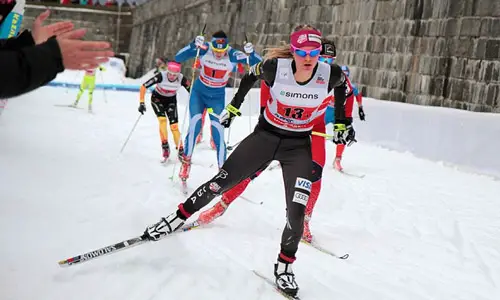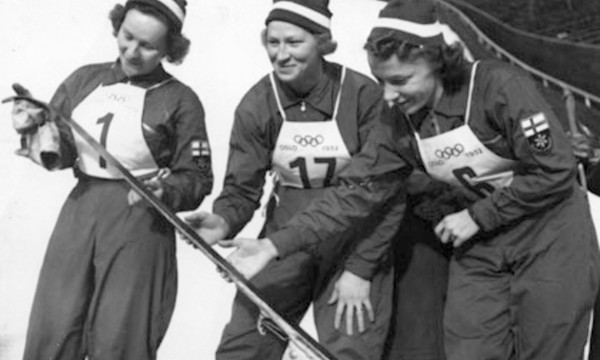Table of Contents
Cross-country skiing has always been regarded as one of the toughest endurance sports. You just have to take a look at the finish line: athletes collapsing one after the other. And it’s not only a physical challenge either! It’s a mental battle as well, how one has to plan ahead, strategize and reserve their energy, especially for a 15 or 30 km race. The best cross-country skiers manage to really master their ability to establish total control over the trail, transforming the race course into their own snow white carpet to the finish line. Here are some of the most memorable races in cross-country skiing history.

Let’s start with that this list, just as any top lists, is heavily based on the personal views and opinions of our editorial team.
#5 Mieto vs Wassberg, Men’s 15 km – Lake Placid 1980 Winter Olympics
We cannot not start our list with one of the most famous battles in cross-country skiing history, fought between two excellent sportsmen that are Juha Mieto (Finland) and Thomas Wassberg (Sweden). At the time of the Lake Placid 1980 Winter Games, Mieto was already a veteran cross-country skier who had several successful years in the 70s. Just to mention a few, he competed in both the 1972 and 76 Winter Olympics, collecting 5 medals, as well as winning several silvers and bronzes from the FIS World Championships. On top of this, in the biggest Norwegian ski event that is the Holmenkollen Ski Festival he won the 50 km event, then later winning the 15 km sprint no less than five times! By the time of the 1980 Olympics, he has seen glory and been regarded as a Finnish skiing legend.
On the other side, besides Mieto, there were 62 athletes from 21 other nations competing in the 15 km sprint. Among them defending champions Józef Łuszczek and Nikolay Bazhukov as well, but the then 23 years old Thomas Wassberg has also decided to go after the gold, even though he only had one major event before stepping into his ski boots at Lake Placid. He didn’t know yet that he will become one of the best cross-country skiers of the 80s, and a real legend.
The 63 athletes ran against the clock, beginning the race in 30 seconds intervals. Mieto, the 6.3 ft tall giant started right behind the reigning champion Józef Łuszczek, while Wassberg launched last, behind the Norwegian Ove Aunli. With a swift start, by the 5 km mark Wassberg was already leading 30 seconds ahead of Aunli and 3 seconds of Mieto. At the 10 km mark the Swede increased his lead to 4.8 seconds, keeping Mieto at bay in second place. The Finn Giant almost caught up with reigning champion Łuszczek who started 30 seconds before him. Aunli managed to catch up with Wassberg, following his tracks and coming back from the 13th place to the 5th. At the 10 km mark the race was so tight for the third place that there were only 2 seconds separating the four fastest athletes behind Wassberg and Mieto.
Long-time skier Mieto jumped into action just before the finish, passing Łuszczek and crossing the finish line in 41:57.64. At this moment, Wassberg was still fighting with Aunli, and only half a km before home he was told that he had one second lead over Mieto. It was a painful and historic sprint to the finish line, arriving in 41:57.63, just one hundredth of a second before Mieto.
That was the closest cross-country ski race in Olympic history, due to which some direct changes were made to the timing regulations of the International Ski Federation, also known as FIS. Since many thought that it was unfair to lower Mieto’s performance due to such close margin, they decided that cross-country ski races should henceforth be rounded to the nearest tenth of a second. But that didn’t change the 1980 Olympics result, rewarding Wassberg with gold and leaving Mieto with silver, even though that the Swede even proposed to cut both medals in half and re-weld it into a mixture of half-gold and half-silver medals.
Though Mieto politely refused the offer, he really couldn’t have been more unlucky, since almost a decade earlier in 1972 he already missed a medal in the 15 km race by only six hundredth of a second! Meanwhile for Thomas Wassberg it was the beginning of a really successful career in which even a fast skating style was named after him in several countries around the globe.
#4 The Norway vs Italy Rivalry, Men’s 4×10 km relay
This one wasn’t even a duel or a battle, but a decade long war between the two nations’ cross-country ski teams, but no less memorable. Some say the rivalry started with the men’s 4×10 km relay event at the Lillehammer 1994 Winter Olympics when the Italian team beat the host nation Norway by only 0.4 seconds. Sure, Norwegians really take pride in cross-country skiing as their national sport and losing by less than half a second must have taken its toll mentally for the relay team being under that public pressure, but…
If Lillehammer 1994 was the first of the Norway-Italy relay battles, then the casus belli, the no. zero incident must have been the Albertville 1992 Olympics when Norway won the same 4×10 km relay event with almost one-and-a-half-minute lead. Except for one, it was the same Italian team losing in 1992 who took it to their heart to take revenge, and that they did. The 1994 Italian relay team included cross-country skiing legend Silvio Fauner, Marco Albarello, Giorgio Vanzetta, and replacing Giuseppe Pulie from the 1992 team was Maurilio De Zolt.
From the Norwegian side it was Bjørn Dæhlie battling with Fauner in the last leg both in 1992 and 1994. The 1994 losing Norway team also included Vegard Ulvang, Thomas Alsgaard and Sture Siversten, of whom all returned four years later for the exception of Ulvang – to take back their national pride.
The next battle took place in Nagano 1998, where race saw both Fauner and Dæhlie returned, but Norway had Thomas Alsgaard as anchor facing off Fauner in the last leg. Alsgaard now did the same move what Fauner had done four years before, sitting on his tail for almost the entire lap and biding his time. The two countries were neck-to-neck for 40 km, and only in the final 150 meters that Alsgaard jumped into action, and finally taking their revenge on Italy by an even closer margin than before, that is 0.2 seconds.
After another four years, the fight continued at the Salt Lake City 2002 Winter Games: this time Alsgaard faced off a partially renewed Italian team with Cristian Zorzi as anchor, and the Norwegian team could once again rub the Italians’ nose in the snow by finishing only 0.3 seconds ahead of Italy. But this wasn’t the end of it, since the next Winter Olympics was held in Turin, Italy.
By 2006, Thomas Alsgaard has already retired from racing, leaving Norway to send a new relay team to their long-time rival’s home ground, while Italy saw Zorzi, Di Centa and Valbusa return and adding veteran Pietro Piller Cottrer to the mix. Many expected a continuing battle between the two nations just as seen in previous Olympics, especially that this time Norway might had the chance to beat Italy on home ground just as they did back in 1994. However, this time the Norwegians’ performance was disappointing, failing to win a medal in relay the first time since 1988, while Italy won gold by 15 seconds ahead of Germany.
As the following Olympic years have seen Italy off the podium, the rivalry still seems to have concluded with 3:2 to Norway, just as somewhere deep in our hearts we might have expected it, being Norway really the home of cross-country skiing – but it was still a quite memorable series of races to watch.
#3 Northug vs Dementyev vs Södergren, Men’s 4×10 km relay – Sapporo 2007 FIS World Championship
We all know Petter Northug, don’t we? But back in 2007, the world has not yet known him that very well, though he was already behind a couple of successful years. The 4×10 km relay event in Sapporo, Japan was a matter of honor for the Norwegians as defending champions. The Norway team saw Lars Berger and Odd-Bjørn Hjelmeset returning, as well as Eldar Rønning and of course Petter Northug joining. The relay event held in the Shirahatayama Open Stadium promised to be a particular race, since Norway’s neighboring rival, Sweden was struck with illness and had no other choice to make changes to its lineup.
At the beginning the outcome seemed pretty unpredictable, as teams changed lead leg after leg. After the first leg, Finland, France and Norway were leading, but both the Finnish and the French were soon outrun by the Swedes and Russians, each already securing the podium for themselves. After the third leg it became clear it’s a three-way race. Petter Northug arrived in the anchor leg against Dementyev and Södergren, but first Dementyev took the lead, while Södergren came up to the second place.
Northug constantly monitored both of them, but especially Dementyev, demonstrating what a wonderful tactician he can be: He waited to the perfect moment, when he suddenly burst out on the final uphill, blewing past both Södergren and Dementyev, and producing such an explosive speed to the finish line that compared to the other two, he seemed to be in a completely different league.
Norway won by 3 seconds over Russia and Sweden, with only 0.3 decisive seconds between silver and bronze. Meanwhile this was the first gold medal for Northug in the FIS World Championship. But have a look at his performance, and watch the video below.
#2 Kowalczyk vs Bjørgen, Women’s 30 km Classical – Vancouver 2010 Winter Olympics
The 30 and 50 km marathons always bring out remarkable and sometimes surprising performances from the skiers, since it is such a long run that one simply has to be bring their best both mentally and physically to be able to keep the strenuous pace.
In Vancouver 2010 the defending Olympic champion would have been Kateřina Neumannová who has won the Olympic gold in the 30 km event for the Czech Republic in 2006. However, as she retired shortly after the Turin Olympics, the title of defending Olympic champion fell on the 2006 bronze medalist Justyna Kowalczyk of Poland, who at the same time was also the reigning world champion – though both of those events were held in the freestyle technique as opposed to the Vancouver 2010 event that is in the classical.
Meanwhile, among the other participants from the 55 athletes included cross-country skiing queen Marit Bjørgen of Norway as well, who has also won the 30 km event in Holmenkollen 2005. On the other hand, Petra Majdič of Slovenia, favorite of many, who also won the 30 km classical in the World Cup 2009, could not participate due to an unfortunate accident just before the qualification started.
With all this in mind, the race still wasn’t expected to be simply a Bjørgen v Kowalczyk battle, since there were also great athletes present such as Aino-Kaisa Saarinen, Therese Johaug, Marianna Longa or Kristin Størmer Steira.
The event started off with a mass start. By the 7.1 km mark the leaders included Størmer Steira, Jatskaja and Kalla, while Kowalczyk took the lead only by the halfway mark, closely followed by Saarinen and Longa. Just as expected, Bjørgen’s performance was moderate and calculated up until she got to the two third of the event, from where she dominated the pace to the finish line. Kowalczyk and Saarinen closely on her tracks, but approaching the final couple of kilometers there were only Bjørgen and Kowalczyk left, the latter gaining on the Norwegian. In the last 800 meters, Kowalczyk took the lead, and for the last hundred meters they were neck-to-neck, both giving everything they have. It almost seemed that Bjørgen will take the lead again if only by an inch, but at the end Kowalczyk broke away to skate to the finish line and win by a 0.3 seconds margin which was an Olympic record in the 30 km event.
Watch it for yourself, it really is a wonder to see.
#1 Charlotte Kalla, Women’s 4×5 km relay – Sochi 2014 Winter Olympics
Now let’s have a look at a truly outstanding performance from Charlotte Kalla of Sweden. In Sochi 2014, the first two legs of the women’s 4×5 km relay event was completed in classic, while the final two legs in freestyle technique. Though by 2014 Kalla was already someone to reckon with, after the first two exchange the Swedish team fell behind, causing Kalla to start the final leg with 25 seconds behind the lead pack, that is Finnland and Germany fighting for the gold. As if they forget about Kalla, Krista Lähteenmäki of Finnland and Denise Herrmann of Germany were too busy with battling each other, when Kalla arrived behind them with a powerful surge, and made it clear that all three were in for the gold.
After her miraculous gain, cutting her deficit in half, Kalla managed to catch up and made it to the final sprint. Taking the inside corner, she took over the lead from Finnland with one move and powered her way to the finish line.
There’s nothing more to add, really. If you have a look at the following footage, her performance speaks for itself. I remember watching this live in 2014, and the surprising revival of the Swedes was jaw-dropping. Let’s hope together for many more just as memorable duels in the future, fought on snow and skinny skis.


